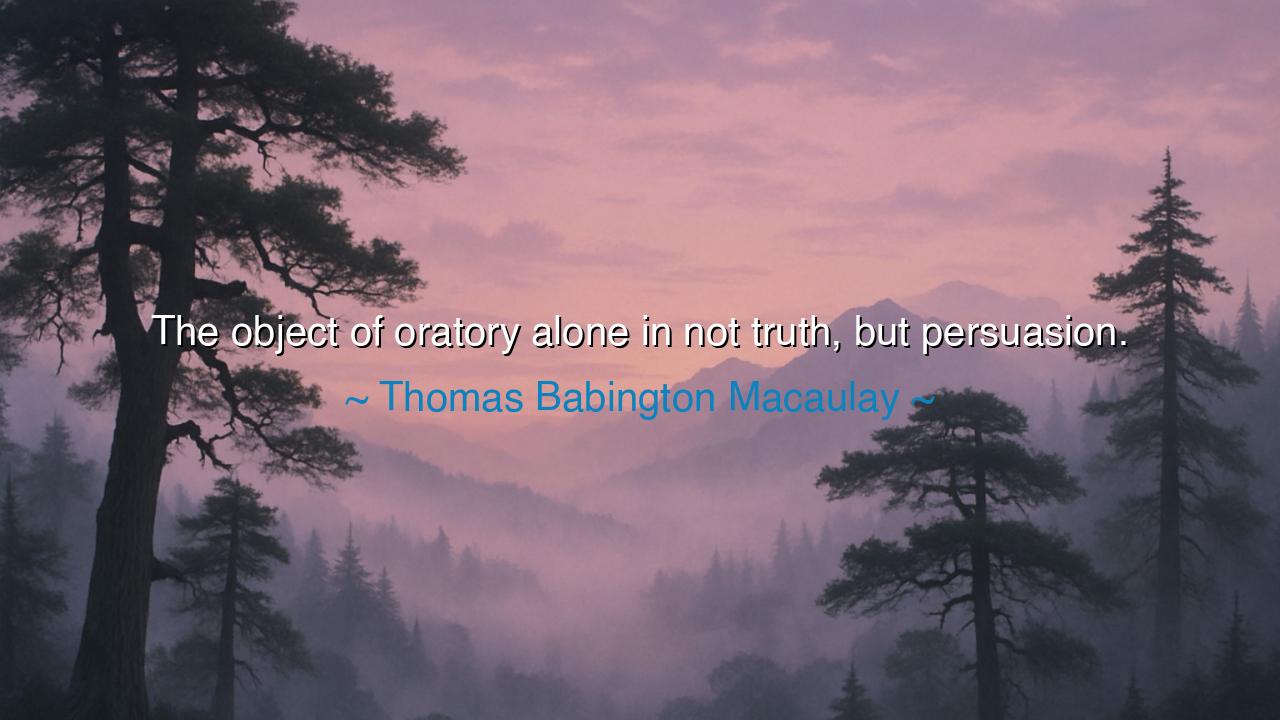
The object of oratory alone in not truth, but persuasion.






In the sharp and discerning words of Thomas Babington Macaulay, historian, orator, and statesman, we find a truth that pierces to the very core of human speech: “The object of oratory alone is not truth, but persuasion.” These words, simple yet immense, reveal the double-edged power of language — that words are not only vessels of truth, but weapons of influence. The speaker’s aim is not always to enlighten, but to move, to stir, to conquer the hearts and minds of those who listen. Oratory, then, is an art not of knowledge alone, but of mastery over emotion, reason, and belief.
The origin of this insight lies deep in the classical tradition from which Macaulay drew his intellectual strength. The ancient Greeks, especially Aristotle, taught that rhetoric is “the faculty of observing in any case the available means of persuasion.” To them, truth was noble, but persuasion was necessary — for it was persuasion that built cities, rallied armies, and moved justice from idea into action. Macaulay, inheritor of this tradition, knew that in the great contests of human history, the tongue often ruled more powerfully than the sword. The orator is not merely a thinker, but a commander — wielding words as soldiers, marching them forth to conquer the hearts of men.
Yet this power, glorious as it may seem, carries danger within it. For persuasion without truth is the seed of deception, and the history of the world is written in both the triumphs and the tragedies of eloquence. The ancients knew this too. The philosopher Socrates stood against the Sophists, those silver-tongued masters who could make the weaker argument appear the stronger. He warned that when the pursuit of victory replaces the pursuit of wisdom, society becomes a theater of manipulation. Macaulay echoes this eternal warning: that the object of oratory — persuasion — must be guided by the moral compass of truth, lest it lead the multitude astray.
Consider the story of Marcus Tullius Cicero, the great Roman orator. His speeches saved the Republic from conspiracy, yet his eloquence also turned the Senate against him when politics shifted. Cicero’s words were flames — capable of warming or consuming, depending on who held the torch. His mastery of persuasion made him beloved, feared, and, in the end, destroyed. But in his triumphs and his fall, we see the truth of Macaulay’s words: that oratory is not the pure pursuit of truth, but the struggle to shape belief — and that this struggle can exalt or ruin the world.
Macaulay himself understood this power not only in theory but in life. As a parliamentarian, his speeches stirred the British people toward reform and progress. He wielded his eloquence as both sword and shield — to defend liberty, to inspire justice, and to strengthen the moral resolve of his nation. Yet he never forgot that persuasion is a tool that can serve either light or darkness. For every Cicero who saves a republic, there arises a Demagogue who deceives one. Thus, the wise must learn not only to speak persuasively, but to discern when persuasion has become seduction.
And yet, we must not despise persuasion for its power; rather, we must reverence it as we would fire — to be used with care, lest it consume what it was meant to illuminate. For even truth, left unspoken or told without spirit, can die unheard. It is persuasion that breathes life into ideas, that carries wisdom from one heart to another. Truth is the seed, but persuasion is the rain that allows it to take root in the minds of men. The orator’s task, then, is to unite the two — to speak with both conviction and grace, so that truth may not only be known, but felt.
Therefore, my child, learn this lesson: speak not only to the mind, but to the soul. Let your words carry both reason and warmth, for persuasion without truth is deceit, but truth without persuasion is silence. Learn to use language as a bridge, not a weapon; to move hearts without distorting light; to inspire, not manipulate. For in every age, the world is shaped by those who speak — but redeemed only by those who speak rightly.
So let Macaulay’s wisdom be your guide: the object of oratory may be persuasion, but the purpose of the speaker must always be integrity. Speak with power, but anchor your power in truth. Persuade not to rule, but to uplift. For words, once loosed upon the air, outlive their speaker — and the legacy of every voice is written not in its sound, but in the light or shadow it leaves behind.






AAdministratorAdministrator
Welcome, honored guests. Please leave a comment, we will respond soon